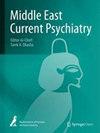阿拉伯医院焦虑和抑郁量表:黎巴嫩癌症患者样本的验证
IF 1.6
Q3 PSYCHIATRY
引用次数: 0
摘要
摘要背景抑郁和焦虑是癌症患者常见的共病性心理障碍。尽管在肿瘤学环境中广泛使用阿拉伯医院和焦虑量表(HADS),但尚未在黎巴嫩癌症患者中得到验证。我们的目的是评估HADS在黎巴嫩癌症患者样本中的可靠性和有效性。贝鲁特美国大学医疗中心血液肿瘤科门诊护理中心的101名黎巴嫩确诊癌症患者填写了阿拉伯版的HADS。采用广泛性焦虑障碍7项量表(GAD-7)和患者健康问卷9项量表(PHQ-9)分别评估其在捕获焦虑和抑郁方面的并发效度。结果采用Cronbach 's α (α)系数进行信度分析,结果显示阿拉伯语HADS量表与抑郁量表(α = 0.86)和焦虑量表(α = 0.78)具有良好的内部一致性(α = 0.89)。HADS与GAD-7和PHQ-9的相关性均有统计学意义,且两种抑郁症的相关性均较强(r = 0.795;p & lt;0.0001)和焦虑(r = 0.727;p & lt;0.0001)。验证性因子分析显示,观察到的数据符合抑郁和焦虑的双因素模型(Kaiser-Meyer-Olkin = 0.86;Tucker Lewis指数= 0.879;均方根近似误差= 0.08)。抑郁和焦虑的比例分别约为52%和25%。结论:阿拉伯语版本的HADS是黎巴嫩癌症患者心理困扰(焦虑和抑郁状态)临床评估的可靠和有效的工具。本文章由计算机程序翻译,如有差异,请以英文原文为准。
The Arabic Hospital Anxiety and Depression Scale: validation in a sample of Lebanese patients with cancer
Abstract Background Depression and anxiety are common comorbid psychological disorders among patients with cancer. Despite the wide use of the Arabic Hospital and Anxiety Scale (HADS) in oncological settings, it has not been yet validated among Lebanese patients with cancer. We aimed to assess the reliability and validity of the HADS in a sample of Lebanese patients with cancer. One-hundred one Lebanese patients diagnosed with cancer presenting to the Ambulatory Care Center in the Hematology Oncology Department at the American University of Beirut Medial Center filled the Arabic version of the HADS. The Generalized Anxiety Disorder 7-Item Scale (GAD-7) and the Patient Health Questionnaire 9-Item Scale (PHQ-9) were used to assess its concurrent validity in capturing anxiety and depression, respectively. Results Reliability analysis using Cronbach’s alpha (α) coefficient revealed good internal consistency for the Arabic HADS ( α = 0.89) and both subscales ( α = 0.86 for depression and α = 0.78 for anxiety). Correlations between HADS with both GAD-7 and PHQ-9 were statistically significant and strong for both depression ( r = 0.795; p < 0.0001) and anxiety ( r = 0.727; p < 0.0001). Confirmatory factor analysis revealed that the observed data fits the two-factor model of depression and anxiety (Kaiser–Meyer–Olkin = 0.86; Tucker Lewis Index = 0.879; root-mean-square error of approximation = 0.08). Depression and anxiety rates were approximately 52% and 25%, respectively. Conclusion We conclude that the Arabic version of the HADS is a credible and valid tool for clinical assessment of psychological distress (anxious and depressive states) among Lebanese patients with cancer.
求助全文
通过发布文献求助,成功后即可免费获取论文全文。
去求助
来源期刊

Middle East Current Psychiatry
Medicine-Psychiatry and Mental Health
CiteScore
3.00
自引率
0.00%
发文量
89
审稿时长
9 weeks
 求助内容:
求助内容: 应助结果提醒方式:
应助结果提醒方式:


